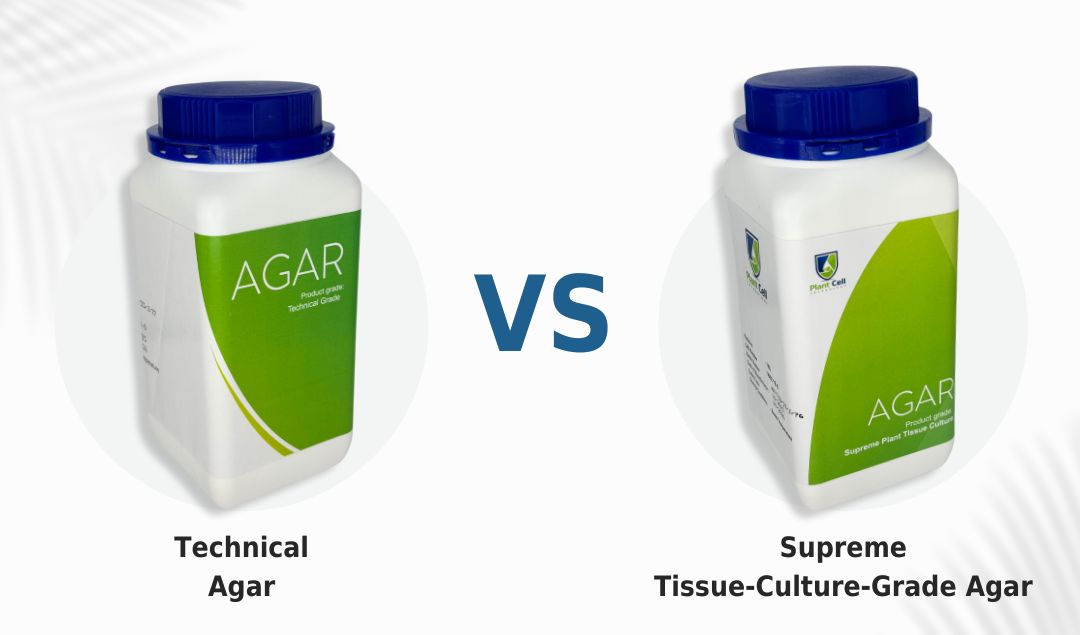
Achieving Disease-Free Cannabis Stocks Using Tissue Culture
As a content and community manager, I leverage my expertise in plant biotechnology, passion for tissue culture, and writing skills to create compelling articles, simplifying intricate scientific concepts, and address your inquiries. As a dedicated science communicator, I strive to spark curiosity and foster a love for science in my audience.


Introduction
Do you know what limits Cannabis commercial production, besides the legal challenges?
A spectrum of diseases and pests.
Cannabis plants are prone to diseases. They are attacked by a range of viral, fungal, and bacterial diseases that limits the production of plants. It not only affects the yield but spoiled all the time and effort put into the process.
Thus, finding solutions to these issues can serve as a magic wand!
It’s not an exaggeration. Because of the prominence of Cannabis as a commercial crop for medical, recreational, and industrial purposes, many individual, small, or large-scale companies are trying their hands on the plant to produce their products.

Thus, any solution to solving the “disease and pest” problem will not only increase the production efficiency of companies but also open the doors to hobbyists and small-scale growers to grow their businesses.
Additionally, will increase the competition in the market and force companies to produce quality products that meet consumer expectations. Thus, the solution won’t only favor the growers but help consumers to obtain their desired quality of Cannabis products.
In this article, we will explore more on why conventional techniques make it difficult to obtain disease-free plants, how tissue culture acts as a potential solution in the area, and how producing disease-free stock can help your business grow (not the end-to-end production but just obtaining plants to grow Cannabis at large scale—this is what you’re looking for).
Why Conventional Techniques Can’t Help In The Production of Disease-Free Cannabis?

Traditionally, Cannabis is grown using seeds or cuttings. However, both processes aren’t efficient to scale up your production. They face numerous challenges, such as pest pressure, disease susceptibility, climatic extremes, and low seed viability.
Further, some disadvantages of the conventional approaches include:
- Vulnerability of fresh clones to environmental stresses
- Labor-intensive approach
- Lower quality and yield of crops
- Disease-and pest susceptibility of crops
- Require a lot of space and maintenance
Cannabis growers prefer to grow the plant using conventional techniques even after these imitations of conventional approaches. This is mainly because of the ease, flexibility, cost, and practice of the technique.
However, they definitely prefer to start their propagation using fresh, clean, and disease-free Cannabis stock produced by tissue culture technique. By combining both conventional and tissue culture techniques, they try to achieve higher production and yield in their available setup.
Thus, producing disease-free stock provides you the opportunity to expand your Cannabis business to fulfill the need of growers in meeting their starting material or mother plant requirements.
How Tissue Culture Allows the Production of Disease-Free Stock?

To understand that let’s first understand what is tissue culture.
Tissue culture is a technology that involves growing plant cells or tissues in a controlled environment, typically in a nutrient-rich medium.
The technique offers many benefits over traditional propagation methods, such as:
- the ability to produce large numbers of genetically identical plants
- the potential to select desirable traits
- the ability to produce the disease-free stock.
Tissue culture is widely used in the production of ornamental plants, fruits, and vegetables, and has been increasingly adopted in the cannabis industry. Compared to alternative techniques, micropropagation yields a greater number of clones. This method does not rely on seeds, resulting in uniform clones that exhibit similar performance to their parent plant. Additionally, plants propagated through tissue culture possess the added advantages of being disease-free, exhibiting increased vigor, and enabling greater yields in a smaller space.
One additional benefit of the tissue culture technique is that it’s sustainable.
How?
The technique requires less space, thus less energy consumption in overall production. Further, as it produces disease-free plants, it doesn’t require herbicides, pesticides, or any other chemicals to fight disease and pests.
How Producing Disease-Free Stock Can Help in Commercial Cannabis Production?

Here’re some reasons how disease-free stock production helps your Cannabis propagation business:
- Increased crop yields: Cannabis plants that are free from the disease are more likely to achieve their full potential in terms of growth and yield. They are less likely to experience stunted growth or reduced yields, which can have a significant impact on the profitability of a cannabis operation.
- Consistent quality: Disease-free cannabis plants are more likely to produce consistent quality flowers, which is important for maintaining customer satisfaction and loyalty in terms of products.
- Reduced risk: Disease-free cannabis plants reduce the risk of crop loss due to disease, which can save businesses significant amounts of money in lost revenue.
- Regulatory compliance: Many jurisdictions require cannabis businesses to produce and sell only disease-free cannabis products, as a way to protect public health and safety.
- Efficient production: By using tissue culture to produce disease-free cannabis stock, businesses can achieve greater efficiency in their production processes. Tissue culture enables growers to produce large numbers of genetically identical plants quickly and efficiently, reducing the time and resources required for propagation.
What Tissue Culture Techniques Are Used To Produce Disease-Free Cannabis Plants?

Many tissue culture techniques are available today for the production of plants for different purposes, such as nodal culture, embryo culture, synthetic seed production, meristem culture, hairy root culture, somatic embryogenesis, etc.
However, in the Cannabis space only the following techniques are used for commercial production:
- Meristem Culture: Meristem is an undifferentiated plant tissue, which has the ability to divide and form any type of plant tissue. Thus, it’s free from any viruses or diseases that can harbor other plant tissues.
The tissue culture process, involving meristematic tissues as starting materials is known as meristem culture. It’s a highly effective technique for producing disease-free and genetically identical cannabis plants. The process involves culturing meristematic tissues, which are regions of active cell division, from the cannabis plant. These tissues are often located at the tips of stems or in the buds and can be used to produce large numbers of identical plants.
During the meristem culture process, the plant tissue is carefully sterilized to eliminate any contaminants that could infect the resulting plants. Once sterilized, the tissue is placed on a nutrient-rich growth medium that promotes the development of new shoots and roots. These new plants are then transplanted into the soil or another suitable growing medium to continue their growth. Meristem culture is highly effective for cannabis production as it allows growers to produce large numbers of genetically identical plants in a short amount of time, thus, more likely to grow and produce a bountiful yield.

- Nodal Culture: It’s a tissue culture technique that involves taking a small section of the stem containing one or more nodes, which are the points where the leaves attach to the stem, and culturing them in a nutrient-rich medium. Over time, new shoots will emerge from the nodes and develop into a new plant.
Though the technique does not help much with eliminating contaminants residing inside plant tissues or systemic pathogens, such as bacteria, viruses, and viroid better than the meristem culture technique, it offers many benefits, including:
- store plants safely
- protect from a range of pathogens, especially eliminate surface pathogens such as powdery mildew
- multiply plants on a large scale
Working with meristem or nodal culture techniques requires one to have some expertise and practice to cut meristematic tissues. And, learning specifically the techniques for business purposes is not accessible everywhere. However, at Plant Cell Technology we make this easy for you through our Cannabis Tissue Culture Master Class.
Become a Pro at Meristem Cutting and Tissue Culture Through Our Cannabis Tissue Culture Master Class

Tissue culture, including meristem culture, has a major role to play in producing healthy plants and preserving elite varieties. However, the process is not that easy when you don’t have experience in it.
Moreover, it will take months for you to create or develop your own procedure—which will require mixing different types and concentrations of chemicals to induce division and differentiation in tissues.
Imagine how much time and money you’ll be required to invest in it!
That’s why we have brought you our comprehensive “Cannabis Tissue Culture Masterclass”. It will be a 3-days class starting from April 20-22, 2023. The class will be conducted by one of the legends in the Cannabis Tissue Culture Industry, Bill Graham.
In this class, you won’t only learn how to produce meristem culture and preserve the genetics of your plant, but a range of other topics, including Pathogen remediation, sterilization techniques, synthetic seed technology, and many more.
Here’s our complete curriculum.
This a one of the most popular Master Class, for which booking has already been started. And, for one-on-experience with our tissue culture expert, only a limited number of seats are available.
So, if you are interested in giving a boost to your Cannabis business, then book your seats TODAY!
Blog Categories
View by Level
Popular Blogs

6 Plant Tissue Culture Books to Keep Learning
Introduction Most of us are fans of books when it comes to learning a topic in detail and in a...
Read More
New Technical Agar Vs Supreme Agar
Introduction What’s the secret element that supports and holds plants in vitro? Not sure? It’s the solidifying agent. Solidifying agents...
Read MoreSubscribe to Our Newsletter







Join the conversation
Your email address will not be published. Required fields are marked